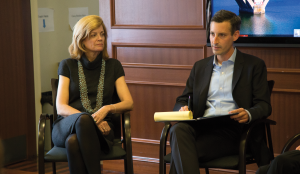
Foreign correspondents have a greater responsibility in light of President Donald Trump’s administration and growing conflict around the world, said Anne Garrels, former senior foreign correspondent at NPR, and Mary Jordan (COL ’83), a Pulitzer Prize-winning reporter for The Washington Post, in a panel discussion at the Mortara Center for International Studies on Monday.
“When the president of the United States stands up and says that we are the enemy of the people, it energizes you in a different way. It’s a particularly important time for foreign news,” Jordan said. “I think people get that there’s an appetite for global news. Worldwide, people are hungry for more information.”
Ned Price (SFS ’05), who was the special assistant to former President Barack Obama, moderated the panel. The panel was hosted by the Lecture Fund and co-sponsored by The Hoya.
According to Garrels, increasing numbers of long-term military commitments, such as the Iraq War, conflicts in the Middle East and tensions between Russia and Ukraine, have raised the stakes for foreign correspondents.
“When I covered Central America, we walked around with T-shirts on that said, ‘Don’t shoot, I’m a journalist,’ with some confidence that actually that would work,” Garrels said. “It has become much more dangerous around the world for foreign correspondents.”
Garrels, who is a member of the nonprofit journalist advocacy group Committee to Protect Journalists, said Trump’s administration poses a threat to journalists. The Trump administration barred several media outlets, including The New York Times and the BBC, from a press conference Feb. 24.
“I’m also on the Committee to Protect Journalists, we are really worried about the fate of journalists,” Garrels said. “Apart from creating an animosity against the mainstream press, I’m concerned that they’re going to go after leakers and journalists.”
Garrels said the role of a foreign correspondent has evolved as a result of the internet.
“We are no longer needed as an impartial witness by both sides because they can go online and they can do their own public relations. That’s what we’ve seen with ISIS,” Garrels said. “We are really more valuable now either as a source of income because we’ve been kidnapped, or dead.”
Jordan, who also served as a foreign correspondent for 14 years, said it is imperative now more than ever that foreign correspondents relay the truth about the news as it is unfolding on the ground, given the rise of sources such as Twitter that can have unverified information.
“I think being a foreign correspondent is arguably more important now than ever,” Jordan said. “There’s no substitute for eyes on the ground, there’s no substitute for smart minds on the ground, especially in the era where there’s skewed news, fake news or just misinformation.”
According to Price, in the age of the internet, news organizations must make a concerted effort to separate fake or biased stories from the real news.
“We need to be cognizant that not everything that is labeled as fake news truly is,” Price said. “Lately we’ve seen a trend where, especially from this administration, fake news is the moniker they apply to everything they disagree with. I think we have to be careful to differentiate what is actual fake news and what the far left or the far right is pushing out intentionally to mislead the public.”
Jordan said technology has allowed foreign correspondents to expand their coverage, especially in zones traditionally not journalist-friendly.
“Our person in North Korea got in and had tens of thousands of people on Facebook Live; people hungry for a look at North Korea,” Jordan said. “Technology I think is fantastic. It is expanding exponentially the numbers of people and the kinds of people we are reaching. In the older days, you’d bring a camera into a difficult place and it was easy to spot. But now, the phone is just bringing you places.”
Garrels warned that technology, while beneficial, opens up a new series of challenges.
“There’s a downside to this, I think, now in terms of 24-hour news we can get access to everybody. You can have an awful lot of blah-blah that is deceptive,” Garrels said. “It just makes it all much easier to have fake news too.”




















